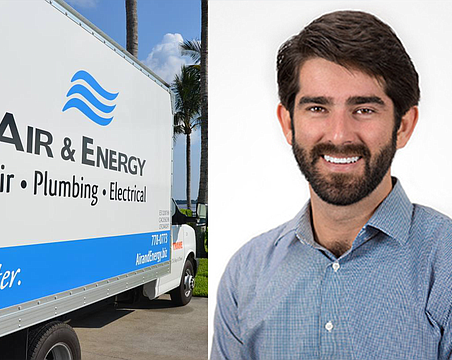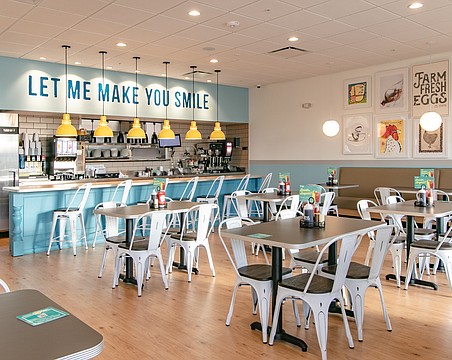Prescription for Success
HEALTH CARE by Jean Gruss | Editor/Lee-Collier
Get doctors and nurses involved in the medical-supply buying process and an amazing thing happens: hospitals save millions of dollars. Here's how a cooperative effort by two Southwest Florida hospital groups does it.
Tucked away in a nondescript warehouse in a Lehigh Acres industrial park, Robert Simpson points to boxes of Johnson & Johnson sutures piled high on shelves.
What makes these sutures so special is that they came straight from Johnson & Johnson, a rare arrangement that bypasses resellers and distributors who tack on their markups.
Simpson's secret: "We guarantee them market share," he says.
Simpson, who is responsible for buying and distributing hospital medical supplies for Lee Memorial Health System and Sarasota Memorial Health Care System, says such arrangements hold down the rising cost of hospital supplies. The sutures deal, for example, will save the two hospital systems $500,000 annually.
Ten years ago, Lee Memorial and Sarasota Memorial embarked on a mission to control medical-supply expenses. They formed two companies: Cooperative Services of Florida and LeeSar. Cooperative Services purchases hospital supplies and LeeSar distributes them to the two systems' five acute-care hospitals. Simpson is president and chief executive of both LeeSar and Cooperative Services.
It's a huge business. Last year, Cooperative Services negotiated about $200 million worth of contracts and LeeSar's sales grew to $100 million this fiscal year, up from $35 million in 2002.
Previously, the two hospital systems belonged to a large group-purchasing organization. But hospital executives felt they weren't getting the savings they had hoped for and decided to go their own way. "We were considered like a rogue nation," recalls James Nathan, Lee Memorial's chief executive officer.
But it's easy to understand why. Supplies are the second-highest expense behind salaries, wages and benefits. When the Lee and Sarasota hospitals began the cost-cutting effort in 1998, inflation of medical commodities hovered around 4% annually, more than double the overall rate of inflation at the time, according to the U.S. Bureau of Labor Statistics.
Since then, several hospital companies in the private sector have launched similar medical-supply management companies to contain these expenses. For example, hospital operator Tenet Healthcare and HCA started Broadlane and HealthTrust, respectively. But on the public hospital front, only Lee Memorial, Sarasota Memorial and St. John's Mercy in St. Louis, Mo., have established their own medical-supply management companies.
By at least one measure, the effort has been successful. Supply expenses at Lee Memorial and Sarasota Memorial hospital systems were both flat as a percentage of revenue in 2006 versus 2005. Nationally, as hospitals and other health care providers have gotten more aggressive about controlling costs, inflation on medical commodities was 1.8% in 2006.
A consultant hired by the hospitals showed that LeeSar and Cooperative Services get better prices than 95% of hospital group-purchasing organizations. In addition, the 6.5% markup LeeSar charges hospitals for distribution is far less than the industry average of 8% to 11%, Simpson says. And Nathan says Cooperative Services and the hospitals have benefited from about $24 million in manufacturer rebates over the last decade. That's not a bad return for an initial investment of $2.5 million by each hospital system.
Now, Simpson is contemplating expanding into other areas of the hospital, from instrument sterilization to food preparation and even power generation. LeeSar is debt-free and is in a good financial position to finance future expansion.
Get me the doctor
The key to controlling medical-supply expense is to get the doctors and nurses to agree to use one or two products almost exclusively. In a complex organization like a hospital, that's a tough thing to do.
But it's essential because that's what gives Simpson a strong bargaining position with manufacturers and it's why some like Johnson & Johnson and Kimberly Clark are willing to bypass middlemen distributors.
Take Johnson & Johnson's sutures, for example. "They provide us with higher commitments," acknowledges Larry Malloy, vice president of channel management for Johnson & Johnson's medical diagnostic group. "We listen to our customers."
Of course, distributors would rather Johnson & Johnson use them rather to shipping directly to hospital buying groups. But, Malloy says, "We say to them: 'You guys have to prove your value.'"
At Cooperative Services, Simpson lands better prices because he can guarantee that a certain product will be used more than 90% of the time for a three-year contract. "We control market purchases for Sarasota to Fort Myers," Simpson says.
Discussions are underway to expand the company to Naples, home to NCH Healthcare System. That would give the group even more negotiating leverage. "They're a logical partner," Nathan says. NCH officials couldn't be reached.
But don't count on Cooperative Services or LeeSar to get too big. Lee Memorial was once part of what's called a group-purchasing organization called Novation, which had 800 hospital members. With 800 hospitals, you'd think Novation would have better pricing power. But it didn't because it couldn't guarantee that a manufacturer's products would be used better than about half the time. "Ten hospitals can out-negotiate 800 hospitals if they can drive market share," Simpson says.
Here's how it works.
Recently, the hospitals targeted pricing for their cardiac rhythm management programs, which includes pricey equipment such as pacemakers and stents. Until recently, Cooperative Services used to buy these products from three manufacturers.
So William Tousey, Cooperative Services' vice president, arranged meetings with doctors in the hospitals' cardiac units to determine which supplies were clinically acceptable. Once they narrowed the list to four manufacturers, Tousey and Simpson turned to the manufacturers and negotiated prices.
One of the keys to successful negotiation is knowing exactly what others are paying for the same supplies. Simpson subscribes to three services that do that kind of detective work. "I can tell you what a needle costs in Puerto Rico," he says.
Another key is to hire people experienced in medical-supply acquisitions and negotiations. "When a manufacturer walks into the room, they recognize them," Simpson says. For example, Tousey was director of surgery at Lee Memorial, overseeing everything from supplies to staff hiring.
On top of best pricing, Simpson says Cooperative Services requests a "patronage fee" of 3% of sales from the manufacturers. This helps pay for Cooperative Services' operations and what's left over is handed to Lee and Sarasota Memorial on a quarterly basis.
For the cardiac-rhythm management program, Simpson and Tousey returned to the doctors at the hospital to inform them which two manufacturers offered them the most favorable pricing. Once they agreed to use the products from manufacturers St. Jude and Medtronic, Simpson signed the contract. The result: $3 million in annual savings on a $40 million contract.
The decision-making is centralized at Cooperative Services, which is intentionally located in Lehigh Acres away from the hospitals. "I'm the only one who can sign a contract," Simpson says. "Vendors can't crack side deals."
Getting the doctors to agree and abide to these cost-control measures can be tricky. "I keep calling myself the sheriff," says Hedy Tomlin, director of supply chain management at Sarasota Memorial.
Tomlin says that's especially challenging on big-ticket items such as pacemakers. Salespeople from rival manufacturers will visit doctors and try to persuade them that they're missing out on the latest technology. "Salespeople are very slick," she says. "They'll use any kind of tactics to get to them."
Tomlin is careful not to confront doctors on the basis of cost only. "We're not building cars; we're caring for patients," she says. "You don't want physicians or clinicians to perceive that you're dictating how to run their practice."
So Tomlin has to be diplomatic about how she approaches doctors. She runs reports on purchases and will gently query doctors when they use a product that hasn't been negotiated by Cooperative Services. "We go back and say, 'Why did you need this?'"
On the distribution side, it took time for LeeSar to become accepted by hospital staffs, who had become used to hoarding supplies because they weren't sure when the next shipment would arrive. "There were concerns about getting the right products at the right place and at the right time," Nathan recalls.
Now, a fleet of LeeSar trucks delivers supplies within 24 hours of when it's needed, reducing costly inventory. The distribution facility in Lehigh Acres plans to install the latest optical scanning and retrieval system before year's end. "I'd love to have them come and clean my garage," Nathan jokes.
Packs, pills and power
Cooperative Services and LeeSar are branching out into other areas of hospital supplies.
Recently, the organizations started packaging their own surgical packs, which include gowns and all the sterilized equipment surgeons need to perform operations. Some of that equipment comes straight from manufacturer Kimberly Clark. Besides saving money by avoiding resellers and distributors, LeeSar can create surgical packs to doctors' specifications.
The companies are also repackaging and distributing medicines in an effort to cut down on waste. Repackaging medicines into small, one-time doses will save hundreds of thousands of dollars, Simpson says.
"This is the tip of the iceberg," Simpson says.
Simpson is exploring establishing a facility to sterilize medical equipment, food preparation for hospital cafeterias and power generation from combustible medical waste.
Meanwhile, it's running out of space at its Lehigh Acres facilities and is exploring moving to new, larger buildings on Treeline Boulevard in Fort Myers near Southwest Florida International Airport.
LeeSar is debt-free, which puts it in good position to obtain financing for expansion. "The banks are chasing us," Simpson says.
A healthy career
Robert Simpson's health care career spans 30 years.
Simpson, who was appointed president and chief executive officer of LeeSar and Cooperative Services of Florida in 2002, earned his stripes as director of operations for Northeast Red Cross Blood Service in 1978, when he was charged with managing blood supplies during a blizzard that year that dumped 12 feet of snow. He headed a platoon of soldiers, armored personnel carriers and a helicopter to ferry precious blood supplies where they were needed.
From 1984 to 1994, Simpson was at the forefront of centralizing materials management services for the first multi-hospital health care system in New England called Neponset Valley Health System.
Then, starting in 1994, Simpson worked for a surgical-manufacturing company where he established national sales. It would be a valuable experience that would serve him well during contract negotiations later on behalf of Cooperative Services.
But he was logging 300,000 miles a year from his base in Orlando and after a successful fight with prostate cancer in 2002 he decided he needed to travel less.
He joined LeeSar and Cooperative Services in 2002, improving the distribution system at LeeSar and striking new deals with manufacturers for Cooperative Services. Lee Memorial Health System and Sarasota Memorial Health Care System created the two companies in 1998.
Simpson has the reputation as a tough negotiator, acknowledges Jim Nathan, chief executive officer of Lee Memorial. "You want him on your team," Nathan says. "But he's a big teddy bear, too."
Simpson is founder and president of Project Perfect World, which takes medical teams around the world to provide free surgery for needy children.
REVIEW SUMMARY
Industry. Health care
Companies. LeeSar and Cooperative Services of Florida
Key. Market share is the key to winning price concessions from manufacturers.





